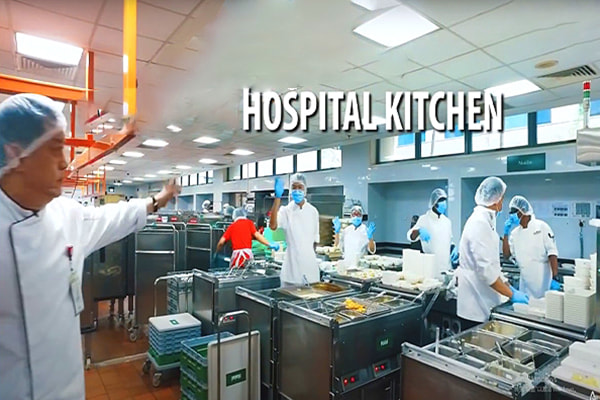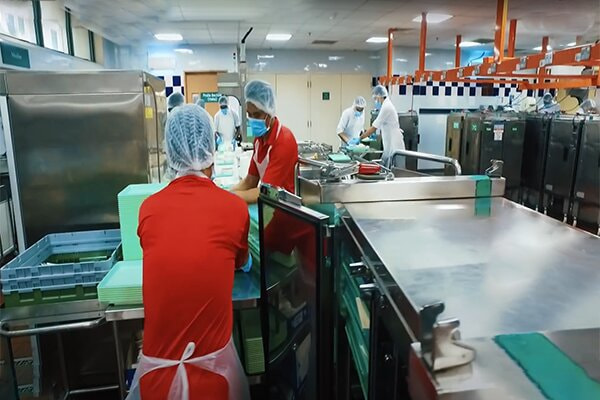



Serving Care: The Daily Meal Operations at TTS Hospital Kitchen


In the initial phase of kitchen construction, we conduct a thorough needs assessment to ensure that the design meets the specific requirements of the hospital. This process includes:
The final outcome is a detailed kitchen layout design, complete with floor plans and 3D renderings for client understanding and review.
Based on design requirements, we will select and install efficient commercial kitchen equipment. This includes:
All equipment is industrial-grade, designed for high-volume use.
Regular maintenance of kitchen equipment is crucial for ensuring food safety and avoiding downtime. Our services include:
To enhance safety and efficiency in the kitchen, we provide regular training for kitchen staff covering:
We offer expert consulting services to assist hospitals in optimizing kitchen operations, including:
To ensure smooth workflows and sustainability in the kitchen, we provide MEP (Mechanical, Electrical, Plumbing) engineering services dealing with:
To meet the needs of large-volume nutritional meal preparations, we offer specialized food service equipment such as:
Additionally, we provide on-site or remote installation and commissioning guidance, as well as training services for kitchen staff.
Over the years, we have completed numerous outstanding projects, ranging from government hospital initiatives to large-scale central kitchens. INEO delivers turnkey kitchen solutions for hospitals that encompass design consulting, facility planning, and project scheduling. Our expertise is also evident in many overseas bidding projects, where we have successfully applied our solutions to meet diverse needs across international contexts.

Chefs who once held supervisory positions in luxurious resorts and chain hotels have now transitioned to hospital kitchens, where they serve nutritious meals for patients. Their responsibilities encompass various aspects, from customizing menus based on patients' dietary requirements to fulfilling special requests for their last meals.
Chefs are responsible for creating menus tailored to patients' health conditions, nutritional needs, and personal tastes. This requires an understanding of a variety of dietary restrictions (such as low sodium, low sugar, gluten-free, etc.) to ensure that every patient receives safe and delicious meal options.
KK Women’s and Children’s Hospital, Singapore's largest maternity and pediatric hospital, prepares 2,000 meals daily for 500 patients and 500 staff members. But that's just the beginning! The kitchen offers six different dish options for patients to choose from, along with over 30 unique therapeutic diets requiring special care and attention. This highlights the complexity of bulk cooking in a hospital setting, where each meal must be customized to meet the individual needs of every patient.
Working in a hospital kitchen demands that chefs possess not only culinary skills but also strong nutritional knowledge. They must understand the nutritional components of ingredients and how to combine them effectively to promote patients' recovery.
Although hospitals are often associated with a somber atmosphere, chefs strive to enhance patients' dining experiences. They pay special attention to the presentation of meals, making every dish as appealing as possible to improve patients' moods during their stay.
A crucial part of a chef's responsibilities in a hospital kitchen is collaborating closely with doctors, nutritionists, and nursing staff to ensure that dietary plans align with patients' medical needs. Chefs regularly participate in quick meetings to obtain updates on patients' conditions and dietary adjustment suggestions.
The chefs who left hotel kitchens to cook for hospital patients
When patients are facing the end of life, they sometimes express desires for special last meals. Chefs often go above and beyond to accommodate these requests, whether it’s a hometown delicacy or a specific flavor, as it represents a deep respect for the patients' final wishes.
The work in a hospital kitchen is frequently conducted under high-pressure conditions. Chefs must quickly and accurately prepare a significant volume of meals within tight time constraints while maintaining high standards of food safety and hygiene.
Beyond cooking, chefs play an important role as emotional support for patients through their interactions. They listen attentively to patients' stories, establishing emotional connections that can significantly alleviate anxiety and provide psychological comfort during a difficult time.
While the shift from luxurious resorts to hospital kitchens represents a significant transition, these chefs find a unique sense of fulfillment and value in their efforts and dedication to providing delightful and health-conscious meals for patients.So much respect for the whole kitchen staff and the hospital team!